Genesis Launch has simplified the "new token launch" process to the extreme.
Written by: Deep Tide TechFlow
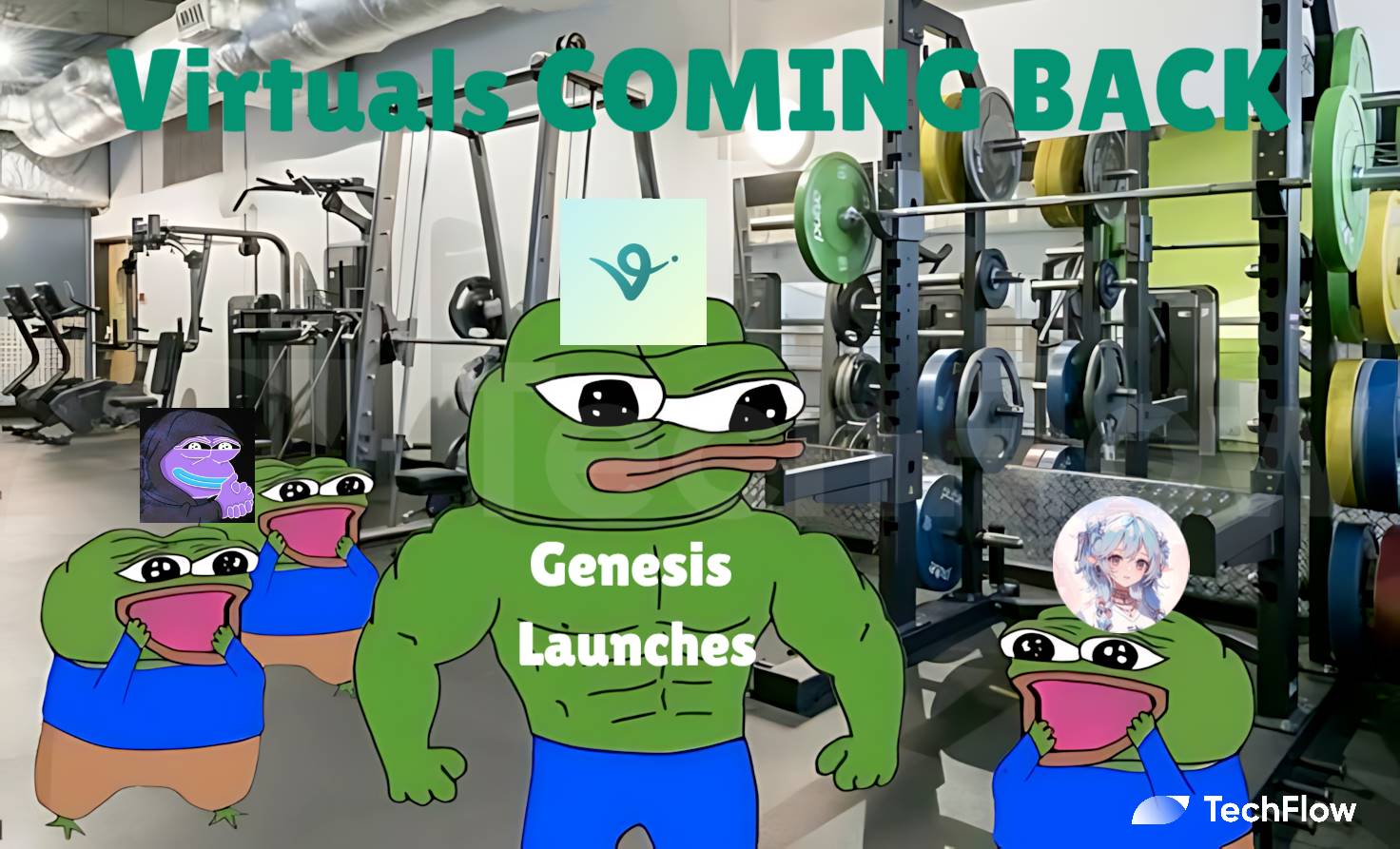
Last year, we noticed VIRTUALS Protocol early on, at a time when the AI Agent craze had not yet begun, and the market cap of the VIRTUAL token was only around 800k.
(For details, see: virtuals.io | The AI Agent version of Pump.fun is coming: What is it like to have an AI agent token that makes money for you?)
The subsequent story is well-known; Virtuals sparked a wave of AI Agent enthusiasm on Base. Besides the impressive performance of the Virtuals token itself, it also led to the emergence of the phenomenal token AIXBT.
However, after a cycle, the hype around AI Agents gradually faded, and the market seemed to fall into silence. With the emergence and iteration of large models like DeepSeek, many felt that the narrative of AI Agents in Web3 was gradually being debunked and was of little use.
Just when you relax your guard and feel disheartened about the market, new ways to create assets always emerge, often leading to dramatic fluctuations in token prices.
In the past week, the price of Virtuals' token surged by 150%, and in just one day, it increased by 42%. Discussions related to Virtuals have once again returned to the crypto news timeline.
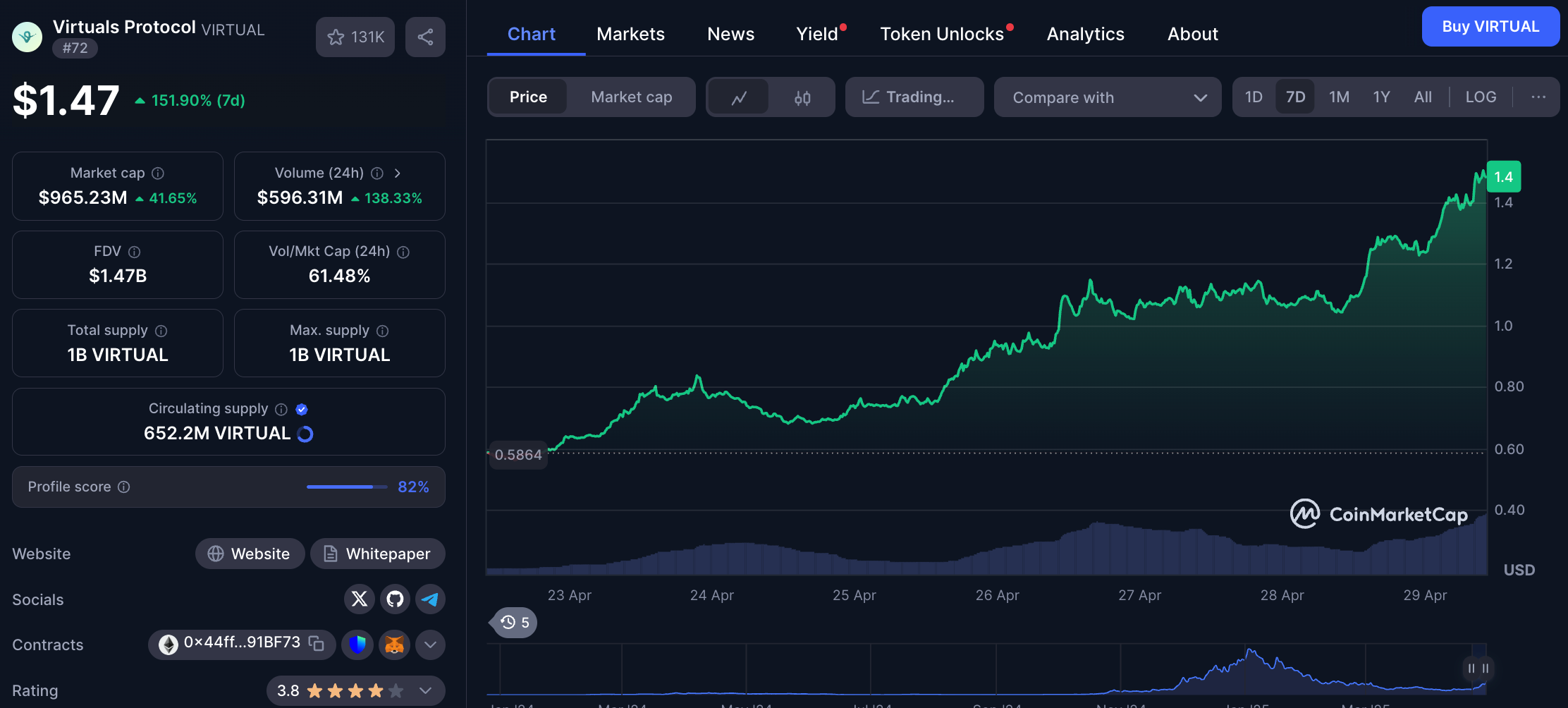
The catalyst for Virtuals' rise can be attributed to the newly launched Genesis Launches event on its platform.
If you haven't heard of this event yet, you can briefly understand it as:
A way for you to gain "priority purchase rights" for popular new AI agent tokens by holding $VIRTUAL tokens and earning points.
To put it simply, it's a change in the "new token launch" model.
Each generation of versions brings new assets. New tokens, new stories, new mechanisms can always ignite market enthusiasm.
Activities and mechanism designs centered around asset creation can easily become the start of new trends.
The previous wave of AI Agents on Base was largely driven by Virtuals; does this round of Genesis Launch contain new opportunities?
We also experienced the product to quickly understand the gameplay and mechanisms of Genesis Launch.
Contributions First, Relaxed New Token Launch
From the official description, Genesis Launch is a fair launch platform specifically designed for AI agent tokens by Virtuals Protocol.
In simple terms, it is a mechanism that allows new AI agent projects to issue tokens through a community-driven approach. Users can gain priority allocation rights for these new tokens by holding $VIRTUAL tokens and earning points.
In other words, unlike Pump.fun where anyone can participate in the rush to buy tokens, participating in the new token launches on Virtuals has conditions; this condition essentially involves using prior contributions to determine participation, which somewhat curbs the rush for tokens at launch.
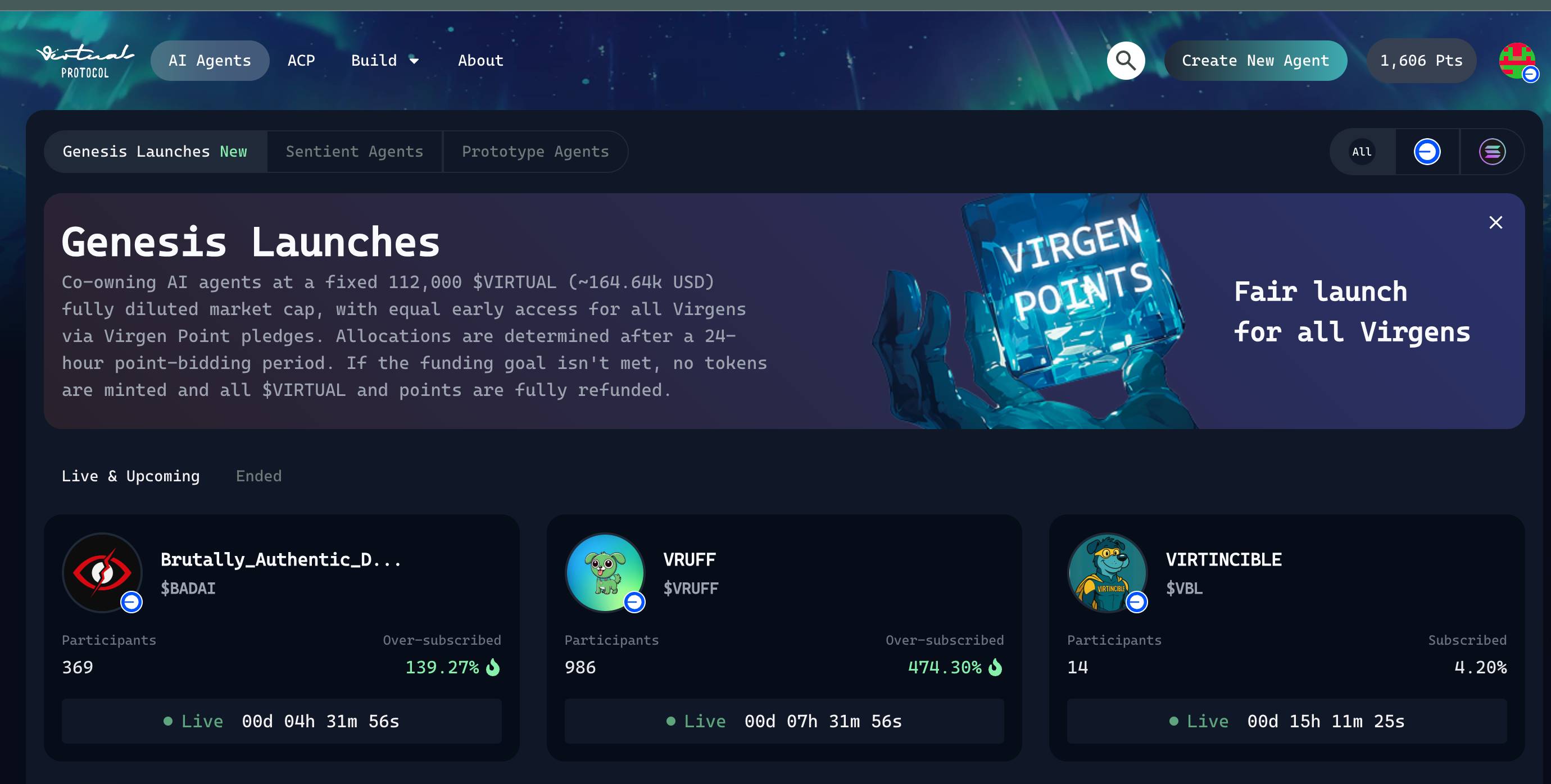
Specifically, in previous platforms' new token launches, snipers relied on high-speed scripts to buy low-priced tokens, while scientists could use multiple wallets and gas fee bidding to dominate most of the shares. Retail investors sometimes couldn't even load the trading interface before the token price doubled.
To participate in a "new token launch," you need to know how to set gas fees, monitor contract deployments, and even stay up late to watch on-chain dynamics. Ordinary players lack the skills and energy, ultimately watching technical experts profit while they struggle to get a share.
Genesis Launch appears to be relatively relaxed and gentle; you don't have to frantically compete for speed at the launch, but rather follow a different logic:
Want to participate in the AI token launch? Then contribute to the Virtuals ecosystem first and accumulate enough points.
How to earn points? For example, by holding $VIRTUAL tokens, staking other tokens, or contributing content to help promote Virtuals, etc. This logic will be explained in detail later.
But looking at it overall, the effect of Genesis Launch is that it has simplified the "new token launch" process to the extreme.
You only need to hold $VIRTUAL tokens, accumulate points, and then stake these two things during the 24-hour presale window for new tokens, and the system will automatically calculate your share of the new tokens.
Detailed Explanation of Points System
Now let's take a closer look at the points system for Genesis Launch.
First, how do you earn points?
The official provides three ways to earn points:
Invest in other Agents within the Virtuals ecosystem. Currently, there are two main categories: Sentient (emotional AI Agents) and Prototype (prototype AI Agents). This essentially means using Virtuals to purchase existing AI agent tokens in the ecosystem; after buying, the points are equivalent to cashback, which you can then use to participate in the Genesis Launch on the platform.
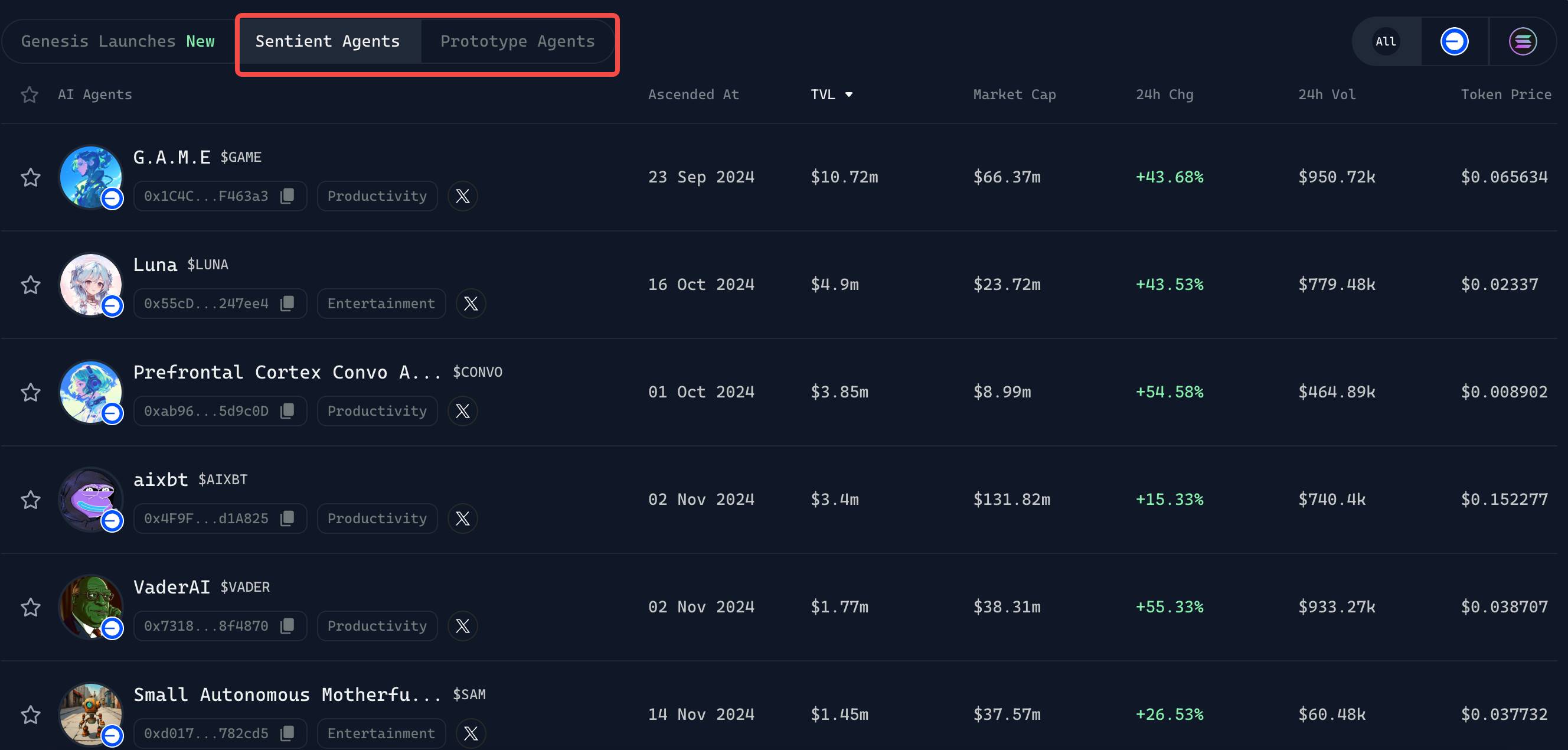
Directly buy and hold Virtuals tokens. This doesn't need much introduction; it's like holding tokens to earn points, similar to a loyalty reward.
Stake $VADER tokens. VADER is also a token from the AI Agent project Vader AI within the Virtuals ecosystem. Holding this token and staking it will earn you points to participate in the new token launch, essentially supporting the Vader AI project. I believe this sets a precedent for ecosystem support, as the staking rules are not fixed, and other projects may also become eligible for "staking for points" in the future.
It is important to note that this points system updates dynamically every day.
Virtuals will distribute a certain total number of points daily, according to different allocation ratios, to players who meet the above three behaviors, incentivizing their contributions to the ecosystem.
In terms of allocation ratios, purchasing other AI Agents in the ecosystem accounts for 75% of the points distribution; directly holding tokens accounts for about 20%, while the remaining 5% goes to staking VADER tokens.
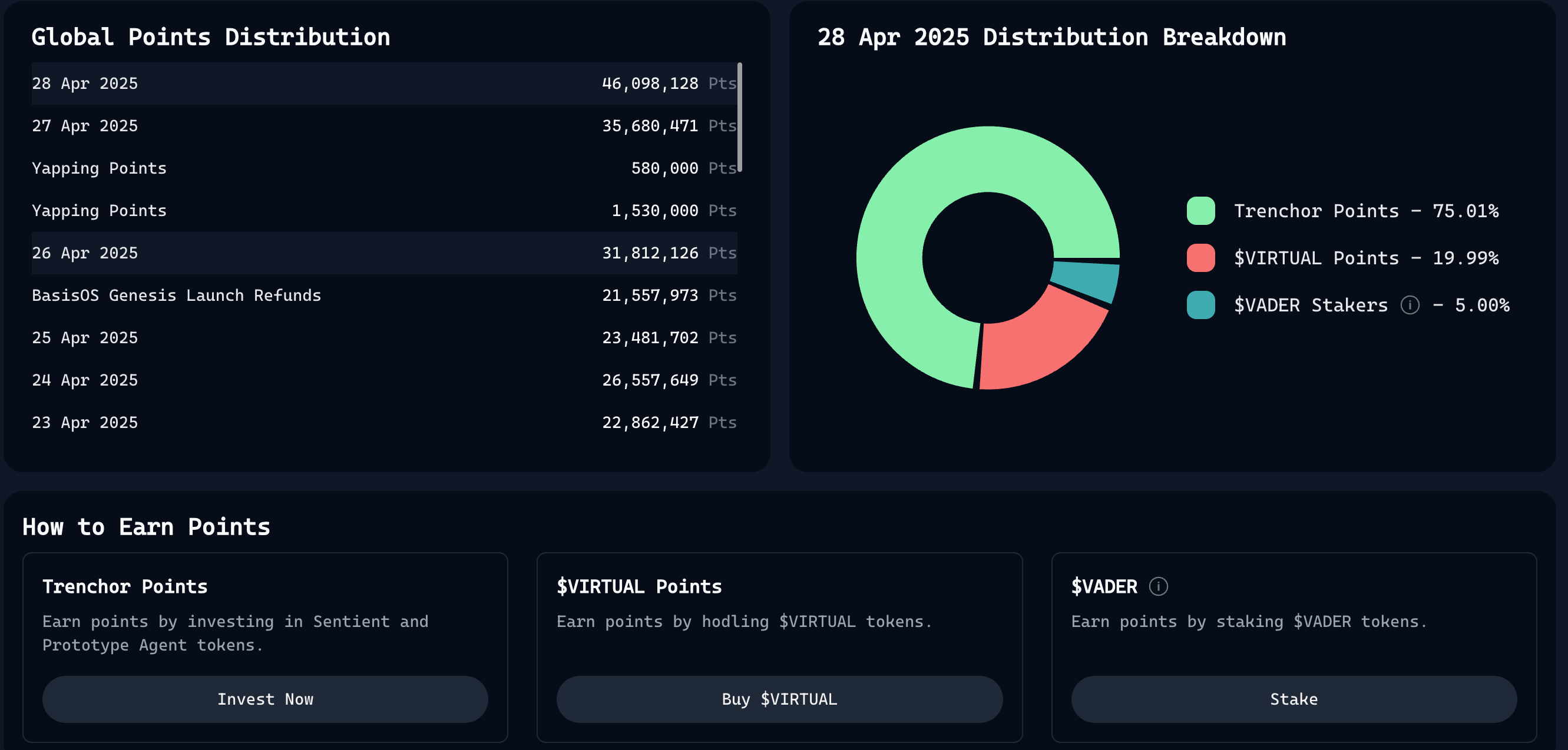
This may also explain, to some extent, why tokens within the Virtuals ecosystem, as well as the VIRTUALS token itself, have seen significant increases in the past week or two.
After understanding this points rule, let's look at how new AI tokens are launched.
Genesis Launch uses a 24-hour presale window, with transparent allocation rules to prevent monopolization, as follows:
- Allocation Ratio: 37.5% of the total supply of new tokens is allocated for presale, 12.5% is injected into liquidity pools (such as Sentient Agent pools), and the remaining 50% is allocated for project development, finance, and marketing. The 37.5% for presale is the "big cake" that retail investors can grab.
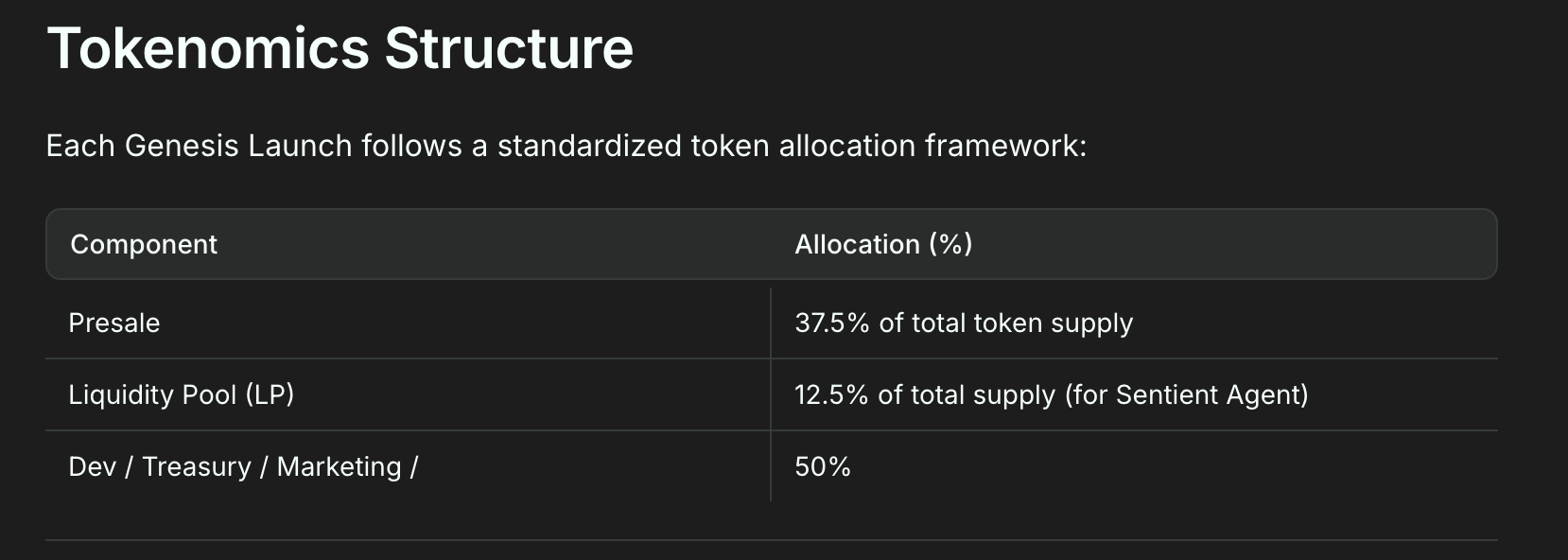
Dynamic Allocation: During the 24-hour presale window, the points you stake determine your allocation share. The more points you have, the more tokens you receive, but each person can only take a maximum of 0.5% of the total supply to prevent large holders from draining the pool. The system will calculate each person's ratio in real-time based on the total points pool of all participants. For example, 1000 points in a total points pool of 100,000 might yield a 1% share of the presale.
Refund Mechanism: If the staked $VIRTUAL and points are not fully utilized, don't worry; the system will refund them to you.
In the Genesis Launch "new token launch" process, you need to stake both points and $VIRTUAL tokens to compete for the allocation rights of new AI tokens.
A simple process is as follows:
Hold $VIRTUAL: Buy $VIRTUAL tokens to prepare your "ticket."
Accumulate Points: Use the three methods mentioned above to earn a certain number of points.
Stake to Participate: After the new token presale begins, within the 24-hour window on the Virtuals website, stake your points and $VIRTUAL. The system will estimate the amount of $VIRTUAL needed for staking.
Wait for Allocation: After the presale ends, the system will calculate your share based on the total points pool, and the new tokens will be credited directly to your account. Any unused $VIRTUAL and points will be refunded.
Claim or Trade: After receiving the new tokens, you can hold them or trade them on a DEX.

Points serve as your "priority certificate" for participating in the "new token launch," determining how much of the new tokens you can receive. The more points you have, the higher your allocation ratio (but each person's limit is 0.5% of the total supply of new tokens).
It is important to note that points will be consumed when participating in the presale. Additionally, the points allocated to you by Virtuals will expire after a certain time if not used, which also encourages you to invest points in participating in the new token launch.
The Virtuals token itself is the cost you invest when participating in a new token launch, and the system will suggest the amount of Virtuals tokens you need to invest based on the points you contribute. The logic here is:
The more points you have, the higher the cap on the tokens you can receive in the new launch;
The fewer points you have, the less meaningful it is to invest more Virtuals in the new launch.
To prevent monopolization, a single wallet can invest a maximum of 566 Virtuals in the new launch, and there is also a 1% transaction tax.
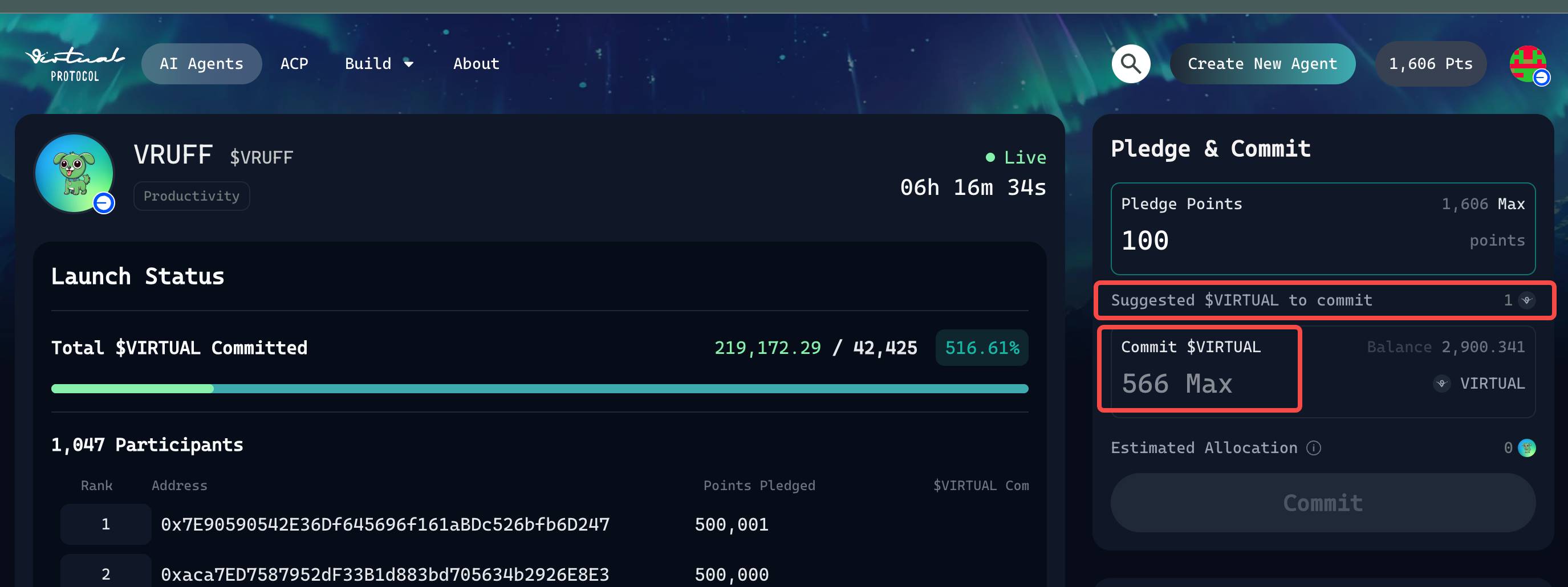
What if you don't have enough points and don't want to buy old assets?
Virtuals has also launched its own Yaps mechanism, allowing players to earn points through content contributions and promotions, providing more options for those looking to participate in new launches at a lower cost.
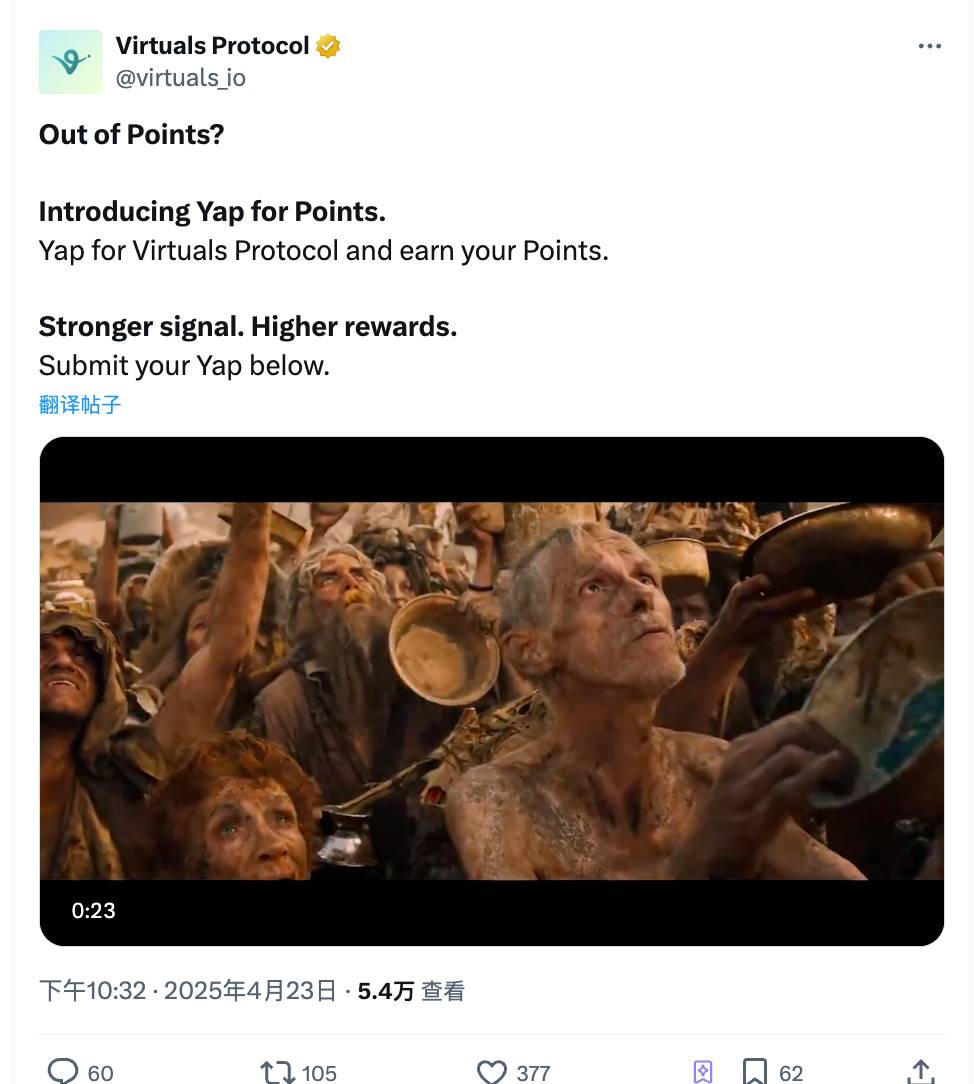
Launching new assets while revitalizing old assets
Experience tells us that the design of mechanisms around crypto assets should not be short-sighted; it's best to achieve multiple benefits at once.
The gameplay of Genesis Launch is clearly aimed at creating new assets while revitalizing existing old assets.
In the Virtuals ecosystem, established AI tokens (such as Luna and AIXBT) already have their own market stories.
As the AI Agent craze cools down, the trading volume and community enthusiasm for these old coins have inevitably experienced a significant decline compared to before.
This wave requires points to participate in new launches, and points must be obtained by purchasing old assets. This design increases the demand for old assets through the new rules of asset creation, thereby driving up the prices of these old assets.
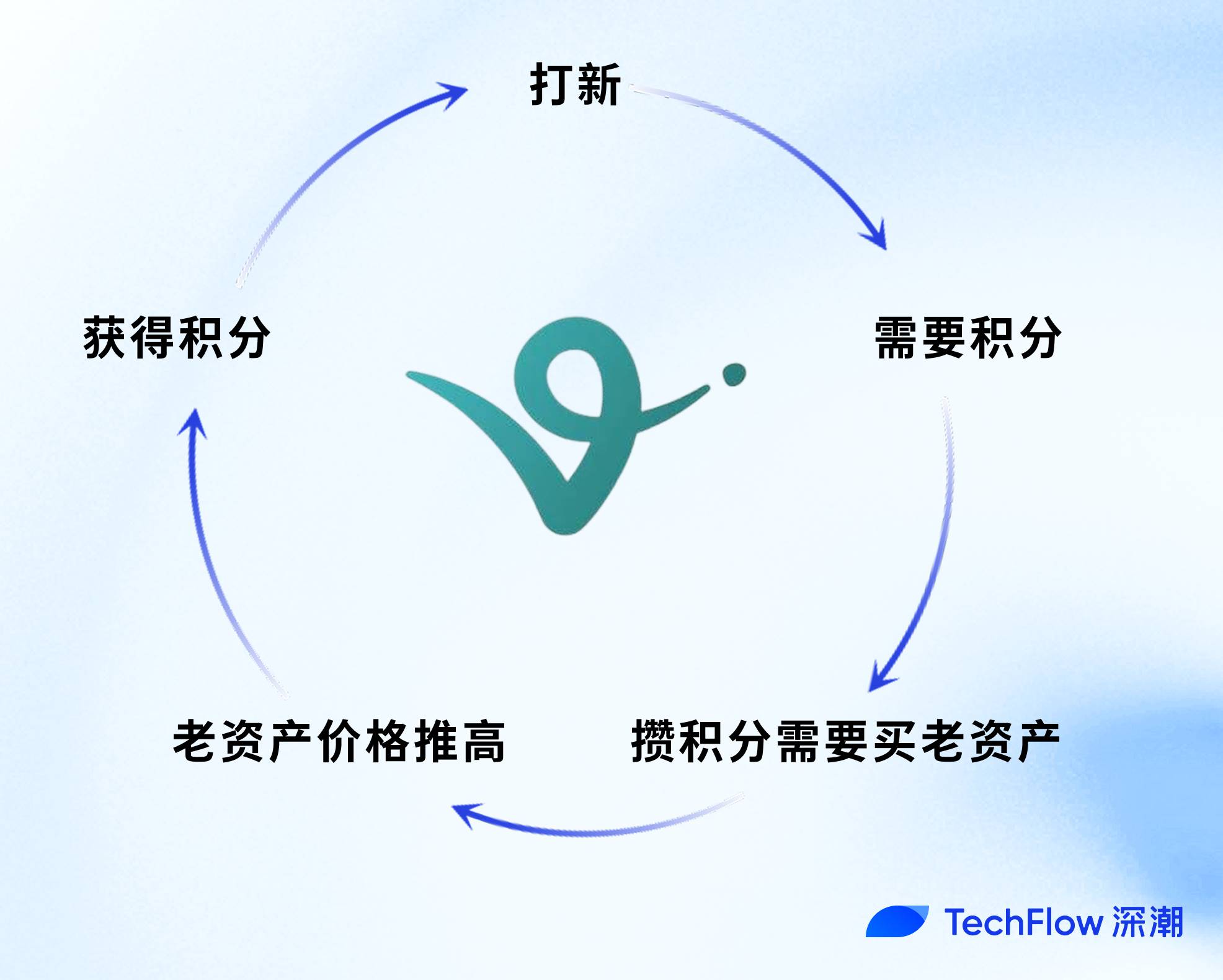
At the same time, the prices of new assets on Virtuals are quietly rising, even with relatively few participants.
For example, the BasisOS token, which was born through this Genesis Launch, has reached a market cap of 5.5 million within 12 days of its launch, increasing 40 times since its initial launch.
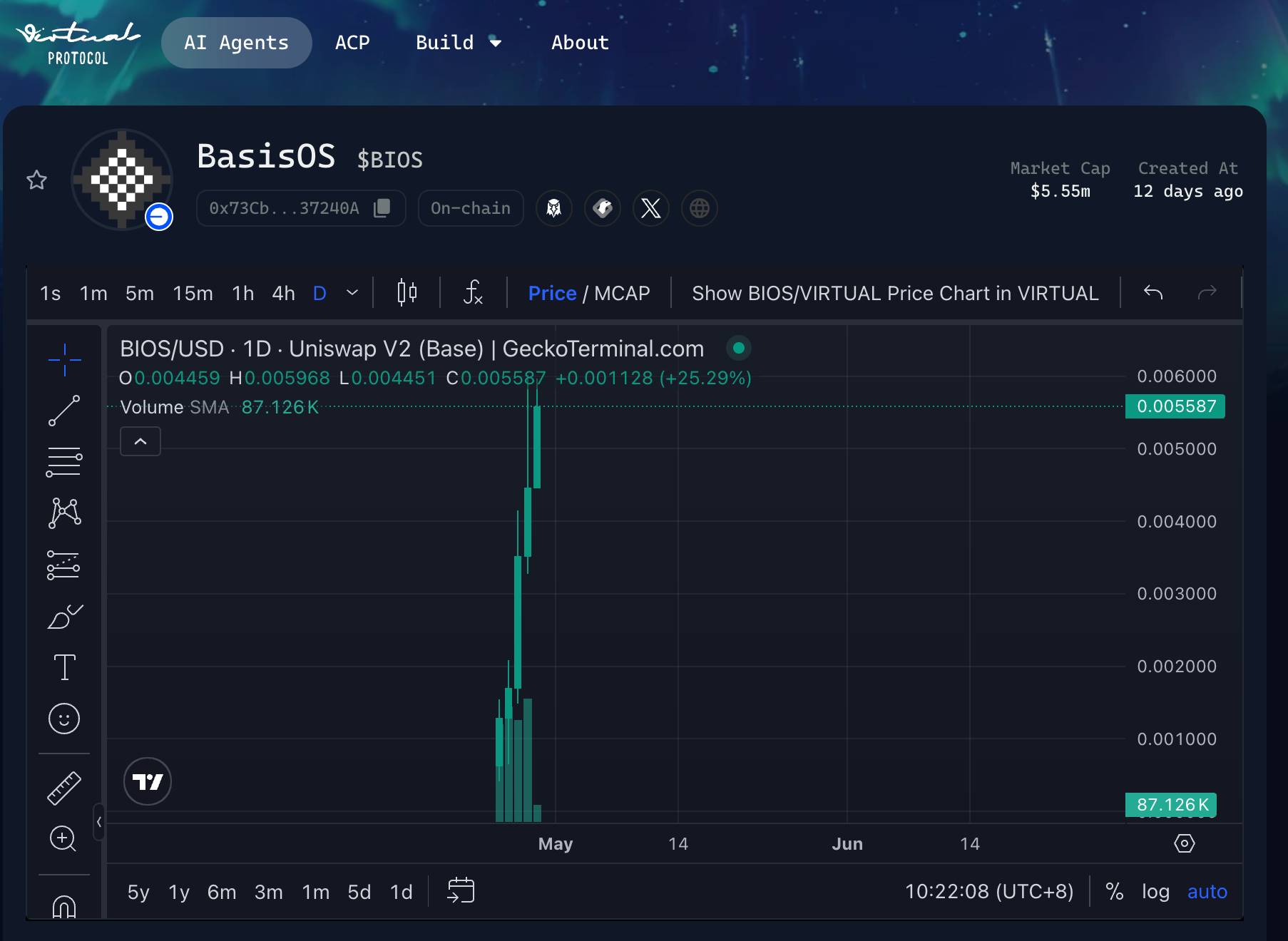
With no significant changes in the technology and narrative background of Virtuals, this "new brings old" approach to asset issuance can indeed stir some waves in the currently stagnant market.
If we look at the broader environment, we find that previously popular AI Agent tokens have all experienced a certain degree of rebound.
Thus, the narrative of AI Agents may not have truly collapsed but is in urgent need of new asset issuance methods; the leading projects from the last cycle are also actively seeking self-rescue by expanding their gameplay to rekindle market enthusiasm.
Everyone's thinking seems to be quite similar; the ai16z on the Solana ecosystem also appears to be doing something similar, creating a new asset launch platform called Auto.fun, and then designing rules to create economic incentives for demand for the AI16Z token, thereby driving price changes in old coins.
As "new launches bring old" becomes a new gameplay version for this round of AI Agent platforms, a better approach for us is to treat old coins as Beta and actively seek new Alpha in this relatively calm market environment.
免责声明:本文章仅代表作者个人观点,不代表本平台的立场和观点。本文章仅供信息分享,不构成对任何人的任何投资建议。用户与作者之间的任何争议,与本平台无关。如网页中刊载的文章或图片涉及侵权,请提供相关的权利证明和身份证明发送邮件到support@aicoin.com,本平台相关工作人员将会进行核查。




